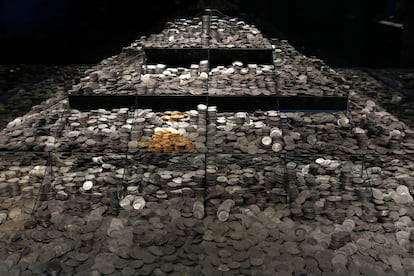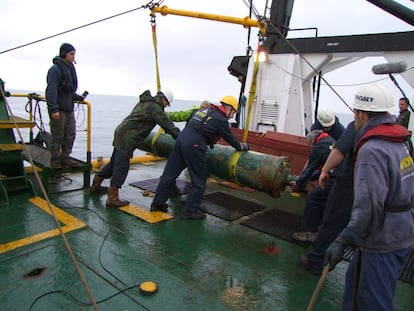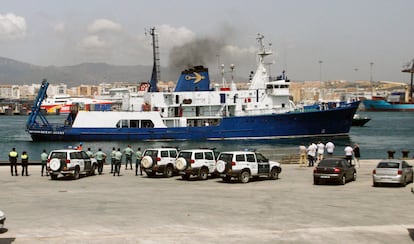Spanish court shelves case against US treasure hunters that looted ‘Mercedes’ frigate
Statute of limitations has passed in a 14-year probe into alleged acts of destruction by Odyssey Marine Exploration when it removed valuable coins from a shipwreck code-named ‘Black Swan’

The history of the Spanish frigate Nuestra Señora de las Mercedes includes two grievances and one victory. The first of the former was when the British Navy sunk it and its 275 crew members on October 5, 1804, off Portugal’s Algarve coast. The second offense came in May 2007, when the US treasure-hunting company Odyssey Marine Exploration scooped up its cargo of 500,000 silver and gold coins from the shipwreck at the bottom of the sea. In order to conceal the origin of the treasure, the company used the code name Black Swan for the recovery project.
Triumph came when the US justice system confirmed that the treasure belonged to Spain, in a ruling released in February 2012. But there was one more affront to come: a Spanish court has just definitively shelved a case into alleged crimes committed by the US treasure hunters as they were removing the coins. After a tortuous 14-year investigation, a courtroom in Cádiz has been left with no option but to let the probe die, albeit admitting its “bafflement” and “anger” over what it considers “unusual proceedings.”
At the same time as the legal process began in Florida to determine who was the rightful owner of the rescued treasure, Odyssey or Spain, a court in La Línea de la Concepción, in the southwestern Spanish province of Cádiz, began investigating whether the then-CEO of Odyssey Marine Exploration, Greg Stemm, and his team had committed any criminal offenses when they removed the haul from the shipwreck. Among the potential crimes were damaging an archeological site and smuggling.

The fact that the 500,000 pieces of silver and gold were returned to Spain in February 2012 – nearly 17 tons of material, which are now held in the ARQUA underwater archeology museum in Cartagena – is proof that the legal battle in the United States ended well for Spain. But the latest decision in the Spanish case, to which EL PAÍS has had access, leaves no doubt that the investigation into potential crimes has definitively been shipwrecked.
The three judges who were responsible for the case found that the shelving, which cannot be appealed, is based principally on the fact that the potential offenses have now exceeded the statute of limitations in Spain for trial. And the slow process of the probe, according to the judges’ writ, was due to the failure of the US justice system to respond to the letters rogatory sent in 2013, and that were needed if Stemm and the rest of the suspects were to be questioned by investigators.
“In terms of the lawsuit over the coins, the United States was on Spain’s side,” explains Ángel Núñez, a public prosecutor who specializes in cultural heritage and who was in charge of the case until 2009. “But it is true that when it comes to targeting one of their own nationals, they are not so willing to collaborate. And given that these were US citizens who are not at the disposal of the Spanish courts…”
The Spanish court probe into Odyssey had already entered into a tailspin before this latest ruling. In December 2016, another judge in La Línea dismissed the case. The private prosecution, which was brought by the company Nerea Arqueología Subacuática, appealed the decision but it was rejected. In a new attempt to not let the legal process die, archeologist Javier Noriega, one of the heads of this small company based in Málaga, took the case to the High Court of Cádiz province, in La Línea, the one that has definitively shelved the proceedings.
In their ruling, the judges add that they share “with the appellant his surprise, confusion and even anger for the, shall we call it, unusual proceedings with this case, at least since the year 2013.” The magistrates do not go so far as to specify what prompted them to feel this way.

Archeologist Javier Noriega believes that he knows all too well what they are referring to. He and his colleagues decided to take up the case – represented by the attorney José María Lancho – as a “professional and moral obligation.” They have since seen how “all of these years can be summed up by the end: exceeding the statute of limitations.” “They avoided entering into the substance of what happened to Spain’s cultural heritage,” the expert complains.
These unusual proceedings in the investigation which the judges mention and that Noriega suffered first-hand were reported on in the Spanish press. In March 2012, a former legal representative for Odyssey, with no authority, entered the courtroom when the judge was absent and persuaded court workers to photocopy the entire findings of the legal investigation so far, as was reported by the Spanish daily Abc at the time. According to Abc, such an action would have allowed Odyssey to prepare a defense against the findings of Civil Guard investigators and decide whether or not to actually take part in the trial.
The actions of the representative were very serious, taking into account that the probe was counting on a protected witness: a diver who had been threatened for having denounced Odyssey, given that he had knowledge of some of its activities in Spanish waters.
Now Noriega, 46, is gloomy about the end of a process that has occupied a significant part of his career. “As people who love our profession, it’s frustrating,” he explains. “It ends up being a defeat for all of us, for culture and for society. And if as well as that, the person responsible has gone unpunished, because of the statute of limitations, that’s very sad.”
Despite the legal setback, the archeologist argues that the court probe contains “evidence of all kinds, archeological, from witnesses, technical, juridical, and a ton of resounding questions that deal with what supposedly happened with an overwhelming truthfulness.”
The expert believes that an opportunity has been missed by Europe to convey “a clear message to the thieves who have spent years destroying the history of those shipwrecks from the modern era all over the world.”
Odyssey Marine Exploration never had any interest in the Spanish frigate beyond the cargo of silver and gold that it was carrying. That was made clear by the destruction caused by the company in the archeological area where the remains of the 275 people killed in the attack in 1804 lay. “When an archeological site is plundered, it is destroyed forever,” states Noriega.
After the site was looted, ARQUA led a scientific excavation that was carried out in three campaigns – from 2015 to 2017 – in which the remains of the shipwreck were documented and the items that the treasure hunters left behind were removed. These included cannon, cutlery and other everyday objects from life on board. The expedition also achieved the challenge of descending 1,130 meters underwater, the maximum depth achieved until that point during a subaquatic arqueological mission by a European country.
While the damage done to a historical site such as the Mercedes shipwreck will not result in a trial or convictions, Núñez believes that the consequences of the process “were positive, from a legal and global point of view.” Noriega goes even further: “Spain and its coasts are, today, possibly the best protected and safest in the world with regard to the protection of cultural heritage against looting.”
Since the Odyssey case, the classification of offenses against historical heritage in Spain has improved, new archeological maps have been created, there is better coordination between administrations, and there is greater social awareness about this kind of offense. It was precisely these weaknesses that the treasure-hunting company Odyssey made use of to make off with the coins. In fact, the activity has presumably lost its appeal not just in Spain but also elsewhere, given that the American company has since abandoned its treasure-hunting activities and is now focusing on underground mining.
Tu suscripción se está usando en otro dispositivo
¿Quieres añadir otro usuario a tu suscripción?
Si continúas leyendo en este dispositivo, no se podrá leer en el otro.
FlechaTu suscripción se está usando en otro dispositivo y solo puedes acceder a EL PAÍS desde un dispositivo a la vez.
Si quieres compartir tu cuenta, cambia tu suscripción a la modalidad Premium, así podrás añadir otro usuario. Cada uno accederá con su propia cuenta de email, lo que os permitirá personalizar vuestra experiencia en EL PAÍS.
¿Tienes una suscripción de empresa? Accede aquí para contratar más cuentas.
En el caso de no saber quién está usando tu cuenta, te recomendamos cambiar tu contraseña aquí.
Si decides continuar compartiendo tu cuenta, este mensaje se mostrará en tu dispositivo y en el de la otra persona que está usando tu cuenta de forma indefinida, afectando a tu experiencia de lectura. Puedes consultar aquí los términos y condiciones de la suscripción digital.









































